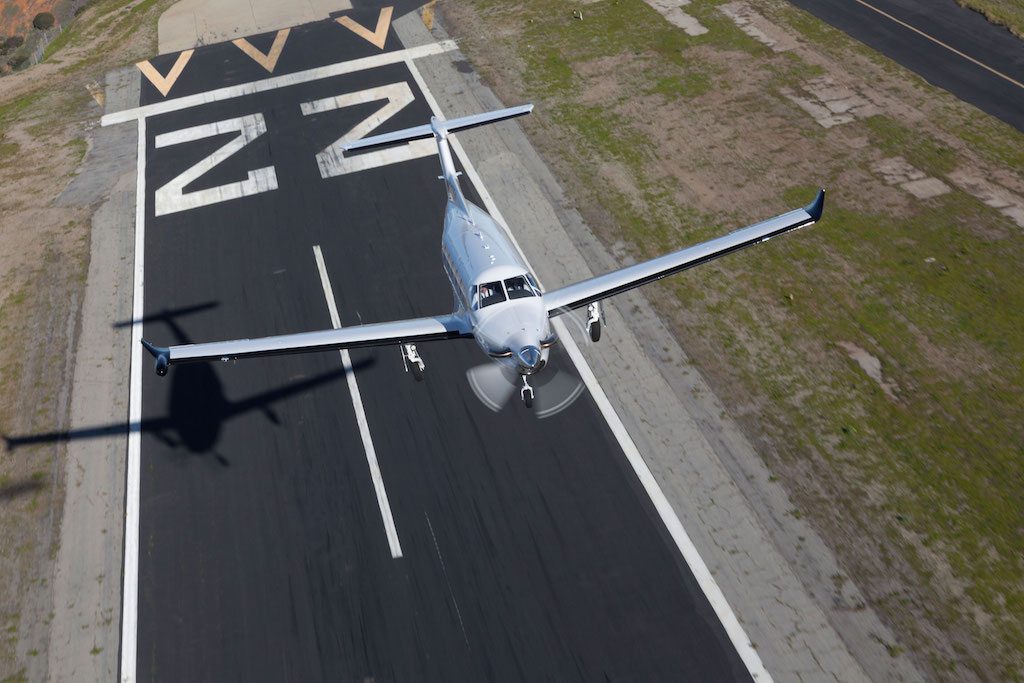Skift Take
The rise of the so-called Brexpat, those who will commute from London to jobs in European financial hubs, is a prime opportunity for Surf Air as it expands in Europe.
Colin Nagy, head of strategy at Fred & Farid, a global advertising agency, writes opinion pieces for Skift on hospitality, innovation, and business travel. Today, he examines Surf Air, an all-you-can-fly airline with operations in the western United States and Europe.
The subscription airline Surf Air launched four years ago in the United States with the premise that there’s a segment of frequent travelers that sits between commercial and fully private — those who have to commute up and down California on a regular basis, but want to do it in a more streamlined way.
Through a monthly subscription, a customer can arrive 15 minutes before a flight to board one of the eight-seat, Swiss-made Pilatus PC-12 planes that run regular routes in California and recently, to Las Vegas. It takes about 30 seconds to book a seat, and you can only book one at a time to avoid people hoarding prime slots.
As I argued in an earlier piece, the brand seems to have found the right approach despite several close competitors failing. It has built a consistent, predictable product that thrives on popular short-haul routes and generally leaves from super-small yet convenient airports. While you might not be flying as fast as passengers on a plane with a pair of jet engines, the single-engine turboprop experience is efficient, comfortable, and thoughtful from the lounge to the flight and arrival.
In June, the brand set its sights on Europe, flying out of London’s Luton Airport to initial destinations of Zurich, Switzerland and Ibiza, Spain. The value proposition is the same as in the United States: Passengers can turn up early and skip the chaos of Heathrow or Gatwick, replete with long security queues, extended marches down the terminal, and annoying busses to transport you to the plane.
Also, in August, nearly 4,000 commercial flights were cancelled across Europe, and more than 162,000 were delayed.
The Rise of the Brexpats
Geopolitics and the chaos of Brexit are now playing nicely in the brand’s favor, as well. London could lose 10,000 banking jobs and 20,000 roles in financial services as clients move 1.8 trillion euros ($2.1 trillion) of assets out of the UK, according to think-tank Bruegel. Frankfurt appears to be the winner so far, with Zurich close behind.
Surf Air’s proposed expansion map has Munich, Milan, Luxembourg, and Dublin to cover other eventualities, as well.
In addition to those who want to just have an easy jaunt to their holiday home in Ibiza, Surf Air believes there is a market for those that will keep their families in London but commute to Europe for work. Consider it the rise of the airborne Brexit commuter.
The cost of this subscription-based travel isn’t cheap: The European prime memberships (which allow for access to every city) start at £3,150 a month, or about $4,140, so one would surmise that some of this will be offset by companies picking up the tab. Or perhaps it will just be paid by well-heeled travelers as the cost of keeping their jobs.
“London to Zurich is one of Europe’s key business travel routes so it was essential that we offer our members daily weekday service between these cities. We will continue to increase this frequency over time, as well expand our European network in early 2018…” said Simon Talling-Smith, CEO of Surf Air Europe.
For a business traveler, the math adds up. Surf Air estimates passengers save four hours on every flight, and when one considers the security and major airport shuffle required for short hops to Europe, this makes a ton of sense.
The one small drawback for central London-based travelers is that Luton is a bit of a hike, requiring a drive or a shuttle bus from the train link. It is, however, a minor annoyance relative to the alternate option.
And the company is making the right decisions stateside, as many of its U.S.-based airports are small, and very convenient to major hubs. This is sure to be a prime consideration as more airports are added into the European network in the future.
Update: On November 23rd, Surf Air announced it is moving from London’s Luton airport to operate out of London City airport. Simon Tilling Smith, CEO of Surf Air Europe, commented: “Our move to London City Airport is what our members asked for and reflects the demand for a more efficient approach to business travel.”
The Daily Newsletter
Our daily coverage of the global travel industry. Written by editors and analysts from across Skift’s brands.
Have a confidential tip for Skift? Get in touch
Tags: airline innovation, brexit, surf air
Photo credit: Surf Air, which has flown Pilatus PC-12 aircraft in the western United States, recently expanded to Europe. Surf Air / Surf Air
